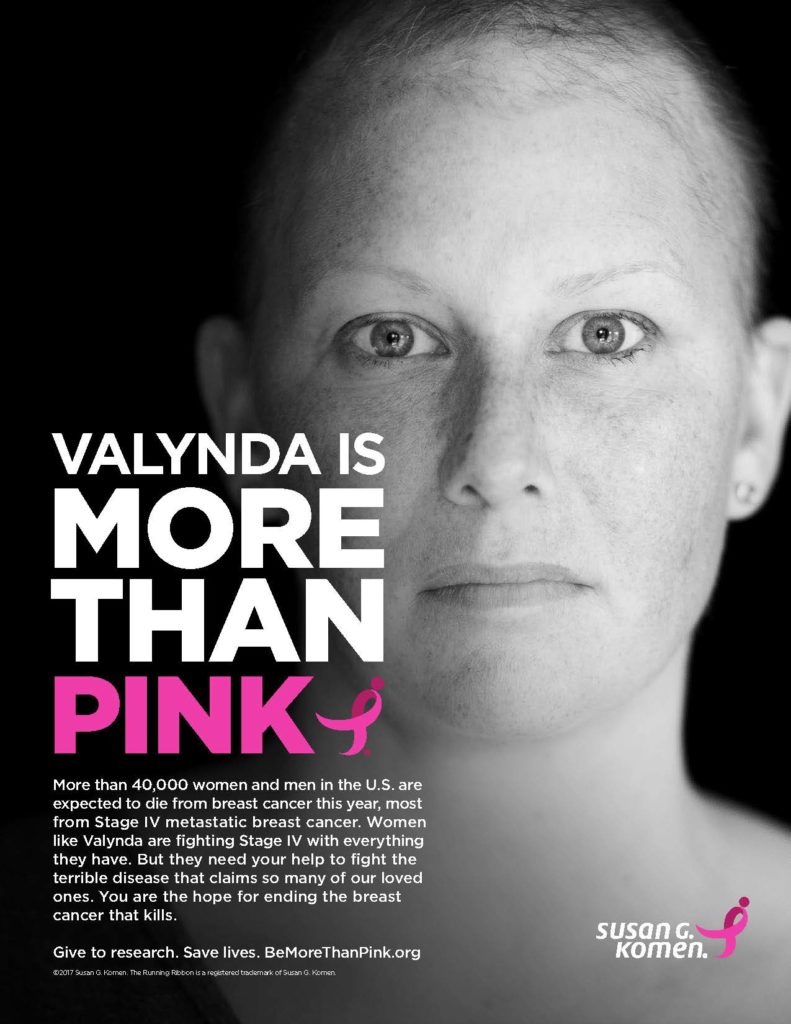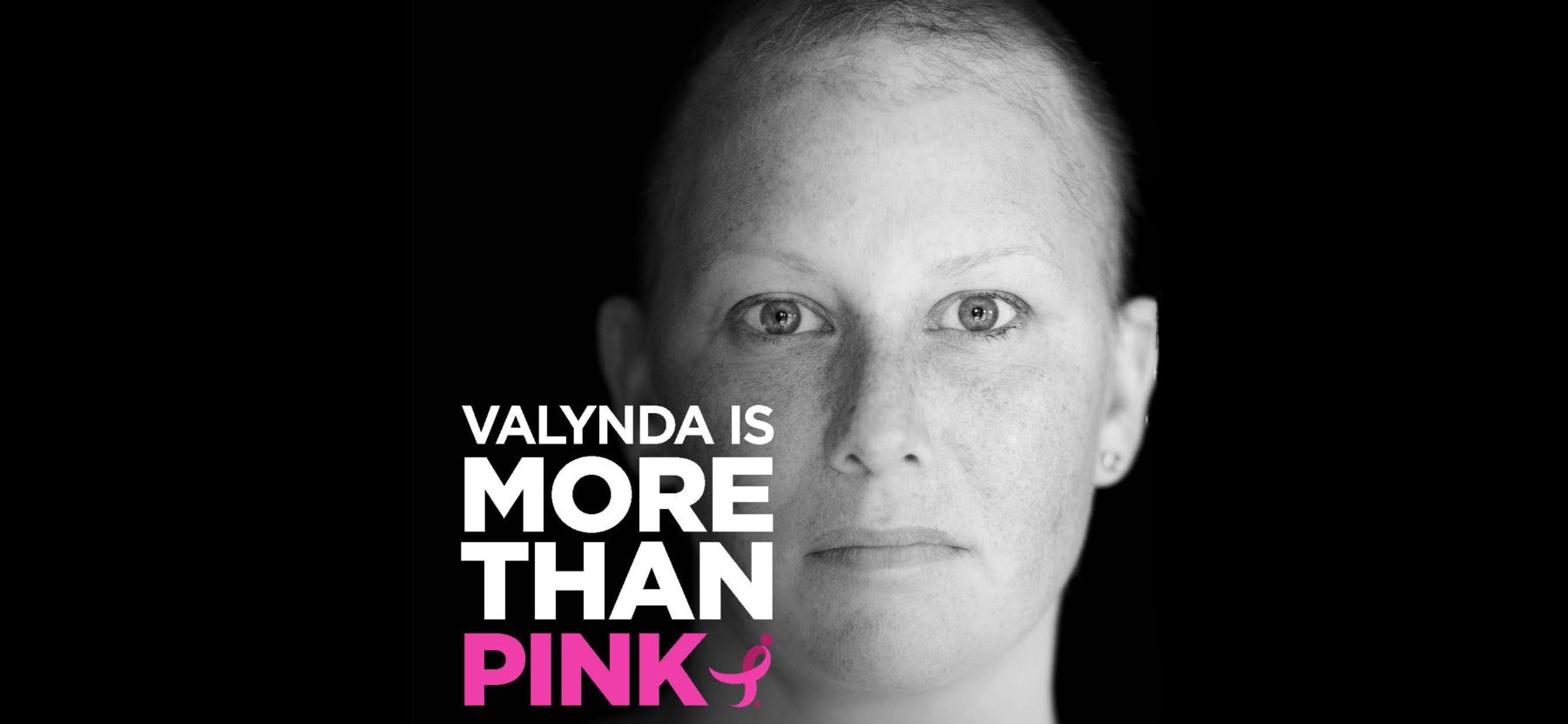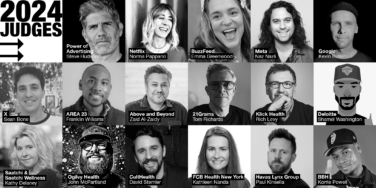October is Breast Cancer Awareness Month, and Susan G. Komen, an organization dedicated to ending breast cancer, wants to make sure people are still aware of just how deadly breast cancer can be. About 40,000 women and men still die of metastatic breast cancer every year. And yet, only 7% of breast cancer research funding—from the government and nonprofits—are directed to Stage IV metastatic breast cancer research.
To help shed light on this issue, and encourage more people to donate to Stage IV metastatic breast cancer research, Susan G. Komen worked with The Dalton Agency to develop new messaging centered around Valynda Planeta, a 38-year-old mother of three who is currently battling stage IV breast cancer. The TV spots, which can be found here and here, show Valynda’s daily life, which includes the removal of her false eyelashes, eyebrows, and wig. The spots also focus on her writing letters to her children that they can read in the future after she dies. The letters are meant to be opened during significant moments in their lives that she will unfortunately not be there for such as graduations, weddings, and the births of their own children.
 PM360 spoke with Andrea Rader, Senior Director, Communications for Susan G. Komen, about the direction of the messaging, why they felt they needed a new approach, and what they hope to achieve.
PM360 spoke with Andrea Rader, Senior Director, Communications for Susan G. Komen, about the direction of the messaging, why they felt they needed a new approach, and what they hope to achieve.
PM360: What led you to develop this campaign focused on Stage IV metastatic breast cancer?
Andrea Rader: Let me step back just a little. Last year, we established what we call the “Bold Goal,” which is to reduce breast cancer deaths by 50% by 2026, and doing that through a combination of enhanced investment in metastatic breast cancer research and in programs that ensure health equity—that is access to good care for everybody. We determined that despite all the tremendous progress that’s been made against breast cancer—certainly since we started this organization in 1982—40,000 women and men still die of breast cancer every year, and the people who are dying are mostly those who have metastatic disease.
Our mission, of course, is to end breast cancer forever, and that means we need to build on progress that we’ve made. So, it really came down to attacking the breast cancer that kills. When we set the Bold Goal last year, we also set a platform of being “More Than Pink,” because we think people look at pink and think of it as light and fluffy and not really serious. And we’re an organization that has been seriously going after breast cancer for many years.
So, as we went through the year we made a conscious decision to start telling the stories of these women and men who have metastatic disease. Currently, we think there is a perception that breast cancer is largely cured and it’s not a problem. What we are trying to do is communicate the idea that this disease is still killing a lot of people, and the people who get it who are not metastatic are in for a life-changing experience. And that’s the rationale behind what The Dalton Agency has produced for us with this messaging.
Do you have any specific goals for this campaign, such as a certain amount of funding for research you hope to reach?
Actually, we have a very unique platform that we’re doing this year in which we are crowdfunding for specific research. If you go to BeMoreThanPink.org, we’ve identified researchers working on metastatic disease and asking people to contribute to these individual researchers, and we’ll add others as these fill up. The rationale behind that is it connects people who are suffering breast cancer or love somebody with breast cancer to the individual stories of these researchers. People like that connection, and understanding that, for example, one of our researchers is motivated by the death of his own mother to metastatic cancer. So, that’s a unique part of what we want to do—connect the community to the people doing the research.
What we also wanted to do through the messaging that Dalton has developed is to tell the real story of a woman who is writing letters to her kids for the time that she won’t be there for them, and really communicate the power and the devastation that this disease can cause.
How did you come up with that approach for the messaging?
It was ultimately a team effort, but Dalton took what we told them about this situation and what we’re trying to achieve and they were able to tell just such a powerful, human, and personal story. Dalton brought the reality of this disease to life very compellingly. It’s a difficult story to tell, a very painful story to tell, but it needs to be told. And they’ve done it with sensitivity and real impact.
Do you have plans to expand this with other patients’ stories or is Valynda going to be the only one?
Over time yes, because the stories of these women and men who develop breast cancer are very important stories to tell. We’re not only trying to tell the story of how we’re racing to save women like Valynda, but also to let other people in the community, especially young women, understand that breast cancer can have life-changing consequences for them. And we want them to be vigilant and to take advantage of the resources that we make available to help them get screened and treated, connect them to clinical trials and connect them as patients to the people who might be able to help them.
Do you have any specific plans yet as to how you will expand this campaign?
As you know, National Breast Cancer Awareness Month is in October, and so a lot of the effort for Valynda’s story has been directed at October. But we’re obviously looking to build on messaging that tells patient stories and survivor stories over time.
Also, we don’t look at this as “a campaign.” We look at this as messaging that amplifies everything we do and why we do it. And so, decisions have not been made on what will come next, but this is messaging that will carry us for at least the next year and perhaps longer.
I know the videos of Valynda haven’t been out long, but have you gotten any response from the breast cancer community yet?
We haven’t measured anything yet, but the response in our social media has been very supportive. This community really rallies around and supports people who are being treated or having difficulty. And so far, anecdotally, the response to the messaging has been very supportive and positive.








